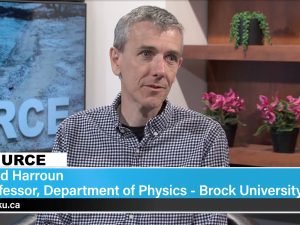
A product of Vitamin A metabolism, retinoic acid, has long been known to aid the development of nerve cells, which are cells that process and transmit information in the brain through electrical and chemical signals.
Brock University biologist Gaynor Spencer is examining how retinoic acid guides the growing nerve cells during their development and regeneration.
Specifically, she’ll be looking at how the growing tips of these nerve cells, called “growth cones,” turn towards retinoic acid and investigate how retinoic acid changes the direction of growth. She will be using snails to study this process.
“If we can utilize the snail nerve cells to actually determine how retinoic acid is doing this, then hopefully that information will be applicable to understanding growth-cone behaviour in vertebrates and mammals,” says Spencer.
She is also examining the role that retinoic acid has in the adult brain by studying how it might be important for learning and memory.
“What we’ve shown in the snail is that when we block the retinoic acid signaling pathway, the animals will still learn, but they won’t show long-term memory,” says Spencer. Her next research phase will be to record the exact changes that take place in the cells of the snail’s brain that might determine why the snail can’t form memory in the absence of retinoid signaling.
But Spencer cautions that it’s still very early days to make the leap to human beings in terms of retinoic acid use for boosting memory. She said the snail is “a relatively simple model system to try to understand basic mechanisms of how these molecules are important in memory processes.”
Spencer is one of 15 Brock University researchers who received Discovery Grant awards totaling $1.98 million for the 2015-2020 funding period. The federal granting agency Natural Sciences and Engineering Research Council (NSERC) announced the results of the 2015 Discovery Grants, scholarships and fellowships competitions for universities across the country June 22.
“Our success rate for those already holding a grant is an impressive 83 per cent, which was well above the average (65 per cent) for small universities in this year’s competition,” says Joffre Mercier, associate vice-president research of Natural and Health Sciences.
“This reflects the hard work and leading-edge quality of our researchers’ work and our growing reputation as a research-intensive university,” he said, adding that Brock received a one-year Research Tools and (RTI) grant of over $25,000.
In addition, seven Brock graduate students were recognized for research excellence with scholarships and fellowships totaling $318,500.
“In a very competitive funding environment, it is a tremendous accomplishment for our graduate students to be selected to receive NSERC awards,” says Mike Plyley, Dean, Faculty of Graduate Studies. “The awards are a clear measure of excellence and recognition of the scope and calibre of work that our students pursue and the potential that their work holds in contributing to discovery and innovation in Canada.”
Research programs for the 14 Discovery Grant recipients span a broad array of subjects ranging from developing prospective memory in young children to biological reasons for why people perceive flavour differently to expanding knowledge of how Vitamin E interacts with cell membranes.
For her part, Spencer says the $225,000 grant she received over five years will allow her to continue to do “competitive” research and to train high-quality graduate students. “NSERC is a lifeline; I wouldn’t be able to continue running a research lab at this level without the NSERC funding.”
NSERC’s “flagship” Discovery Grants program provides core research funding “so Canada’s best researchers can pursue their most promising ideas and breakthrough discoveries – world firsts in knowledge,” said the agency’s June 22 media release.
“Today’s investment in more than 3, 800 researchers at 70 universities across the country ensures Canada has a broad base of talented men and women whose research continues to push the boundaries of knowledge, creates jobs and opportunities while improving the quality of life of Canadians,” said Ed Holder, Minister of State (Science and Technology).
Brock University’s results for the 2015-2020 NSERC Discovery Grants competition are:
Brand, Uwe (Earth Sciences): Modern and Deep Time oceanography (SSC, SLC) & climatology (SST): insight from brachiopod archives
Fuk, Henryk (Math & Statistics): Computational problems in spatiallyextended discrete dynamical systems
Harroun, Thad (Physics): Biophysical aspects of vitamin E
Hunter, Fiona (Biological Sciences): Systematics, Behavioural Ecology and Disease Transmission of Biting Diptera
Klentrou, Panagiota (Kinesiology): Factors affecting the osteogenic exercise threshold
Li, Feng (Chemistry): Molecular Engineering of Deoxyribozymes for Amplified Protein Detection and Cell Imaging
Mahy, Caitlin (Psychology): The development of prospective memory in early childhood: Contributions of retrospective memory and executive control processes
Pickering, Gary (Biological Sciences): Taste phenotypes and implications for food and beverage behaviour
Samokhin, Kirill (Physics): Theory of noncentrosymmetric and other unconventional superconductors
Spencer, Gaynor (Biological Sciences): Mechanisms underlying the effects of retinoic acid on neurite outgrowth and network plasticity
Stuart, Jeffrey (Biological Sciences): Characterization of a mitochondrial redox switch regulating cell growth, stress resistance, and metabolism
van der Est, Arthur (Chemistry): Time Resolved EPR Studies of Natural and Artificial Photosynthesis
Ward, Wendy (Kinesiology): Food Bioactives and Bone Metabolism
Xu, Xiaojian (Math & Statistics): Optimal and Robust Designs for Regression
Also, Wendy Ward (Kinesiology) and co-applicants Paul LeBlanc (Health Sciences) and Sandra Peters (Kinesiology) were awarded a Research Tools and Instruments Grant to purchase infrastructure to support ex vivo analyses of hard tissue.
The results of NSERC scholarships and fellowships are:
Doctoral — Canada Graduate Scholarship ($35,000 per year for three years)
Barelli, Larissa (Microbiology): Plant-fungal symbiosis: A systematic study of Metarhizium root colonization
Simone, Jonathan (Biological Sciences): Investigating the role of cannabinoid receptor signalling in the regulation of behavioural fear in male and female rats
Doctoral — Postgraduate Scholarship ($21,000 per year for three years)
Awde, David (Biological Sciences): The reproductive ground plan hypothesis in primitively eusocial sweat bees
Hodges, Travis (Psychology): Epigenetic modifications in response to repeated social experiences in adolescent and adult rats
Master’s — Canada Graduate Scholarship ($17,500 for one year)
Day, Devon (Applied Health Sciences): The effects of transcranial magnetic stimulation on human balance control
Lustig, Kari (Psychology): The role of sleep and hormones in processing emotional information
Rat, Ramona (Mathematics & Statistics): Extreme Value Theory: Rogue waves, heat waves, and cold waves








